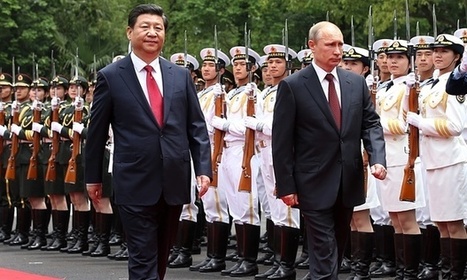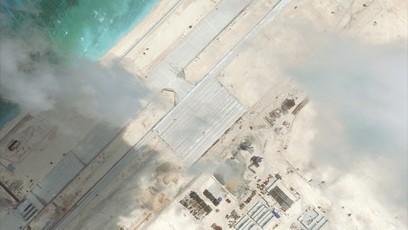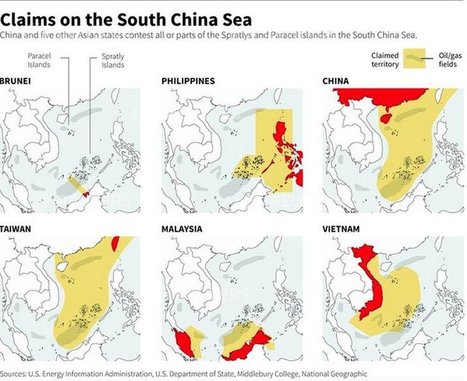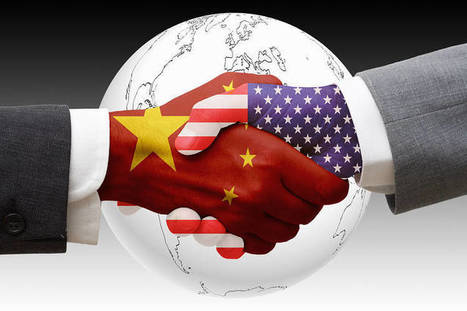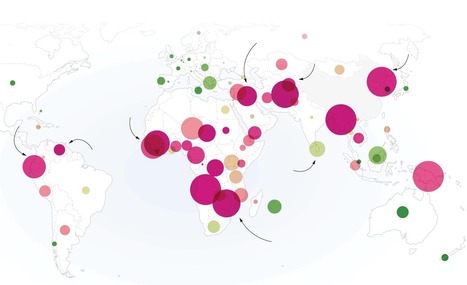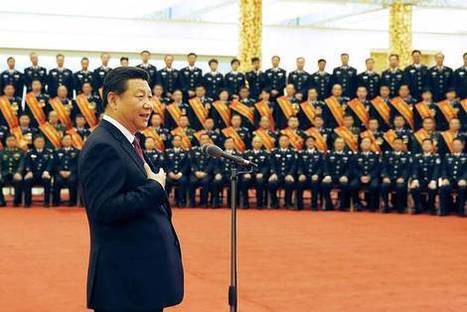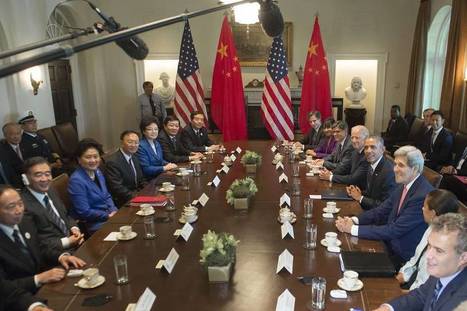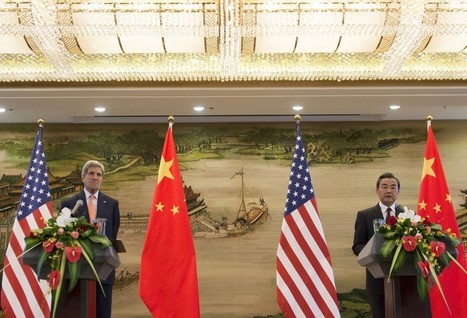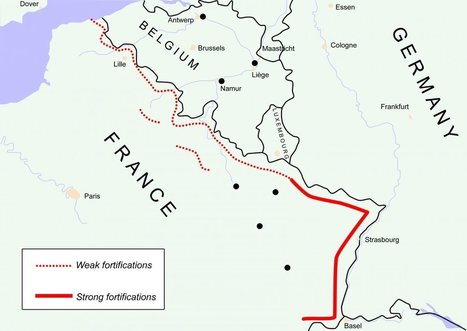 Your new post is loading...
 Your new post is loading...
"EL CHACO, Ecuador — Where the Andean foothills dip into the Amazon jungle, nearly 1,000 Chinese engineers and workers have been pouring concrete for a dam and a 15-mile underground tunnel. The $2.2 billion project will feed river water to eight giant Chinese turbines designed to produce enough electricity to light more than a third of Ecuador. • Near the port of Manta on the Pacific Ocean, Chinese banks are in talks to lend $7 billion for the construction of an oil refinery, which could make Ecuador a global player in gasoline, diesel and other petroleum products. • Across the country in villages and towns, Chinese money is going to build roads, highways, bridges, hospitals, even a network of surveillance cameras stretching to the Galápagos Islands. State-owned Chinese banks have already put nearly $11 billion into the country, and the Ecuadorean government is asking for more. • Ecuador, with just 16 million people, has little presence on the global stage. But China’s rapidly expanding footprint here speaks volumes about the changing world order, as Beijing surges forward and Washington gradually loses ground."
Forget euro summits and G7 gatherings: for the countries that like to style themselves as the world’s rising powers, the real summitry takes place this week in central Russia, where Vladimir Putin will hold court.
Leaders of the Brics countries (Brazil, India, China and South Africa) will meet Putin in Ufa on Wednesday, then make way for the Asian powers grouped in the Shanghai Cooperation Organisation.
Russia and China are the common denominators, as in so much geopolitics these days. The UN security council, Apec, the G20 - Russia and China are the ever-presents, a powerful pairing whose interests coincide more often than not.
"New images taken just this week show China building what look like military bases on reclaimed land in the South China Sea, a development likely to add to concerns in the United States and among its Asian neighbors. • China said on Tuesday that land reclamation had now finished on "some islands" in the South China Sea. But the focus is now likely to shift to the construction work that China is carrying out, which many fear will lead to further militarization of the South China Sea. • Images taken as recently as June 28 show how China has almost completed the construction of an airstrip at Fiery Cross Reef. The images were taken by Digital Globe and supplied to The Post by the Asia Maritime Transparency Initiative (AMTI) at the Center for Strategic and International Studies. • Land reclamation is now complete at Fiery Cross Reef. AMTI says construction of the air base is continuing “with ongoing paving and marking of the airstrip, an added apron, construction of a sensor array and development of additional support facilities.”"
Since the start of its post-Mao reforms in the late 1970s, the communist regime in China has repeatedly defied predictions of its impending demise. The key to its success lies in what one might call “authoritarian adaptation”—the use of policy reforms to substitute for fundamental institutional change. Under Deng Xiaoping, this meant reforming agriculture and unleashing entrepreneurship. Under Jiang Zemin, it meant officially enshrining a market economy, reforming state-owned enterprises, and joining the World Trade Organization. Under Hu Jintao and Wen Jiabao, it meant reforming social security. Many expect yet another round of sweeping reforms under Xi Jinping—but they may be disappointed.
The need for further reforms still exists, due to widespread corruption, rising inequality, slowing growth, and environmental problems. But the era of authoritarian adaptation is reaching its end, because there is not much potential for further evolution within China’s current authoritarian framework. A self-strengthening equilibrium of stagnation is being formed, which will be hard to break without some major economic, social, or international shock.
"For learners who don’t want to invest in a full residential college ride, or who want to avoid the massive amounts of debt associated with university studies, a program called MITx could be a viable alternative. • With the advent of the internet came a revolution of information becoming available to the average person. MIT University took it one step further when they began a program called OpenCourseWare, which allowed anyone to download full course materials for virtually all classes for free. • But the new MITx interactive online learning platform will go further, giving students access to online laboratories, self-assessments and student-to-student discussions.
"Both of these statements are true: 1. China possesses a rapidly improving military that, in certain local or regional engagements, could match — and even defeat — U.S. forces in battle. 2. • In military terms, China is a paper dragon that, despite its apparent strength, is powerless to intervene in world events far from its shores. • Seeing the distinction between these two ideas is the key to understanding China’s strategic aims, its military means and the threat, if any, that the country poses to its neighbors, the United States and the existing world order. • Beijing’s goals include 'securing China’s status as a great power and, ultimately, reacquiring regional preeminence,' according to the 2015 edition of the U.S. Defense Department’s annual report on Chinese military power. • China is not a global military power. In fact, right now it doesn’t even want to be one. But that doesn’t mean the world’s most populous country doesn’t pose a threat to the planet’s wealthiest and most powerful one. • Yes, the United States and China are at odds, mostly as a result of China’s expanding definition of what comprises its territory in the western Pacific, and how that expansion threatens U.S. allies and the postwar economic order Washington was instrumental in creating."
"WASHINGTON (Reuters) - China is mounting a serious effort to challenge U.S. military superiority in air and space, forcing the Pentagon to seek new technologies and systems to stay ahead of its rapidly developing rival, Deputy Defense Secretary Robert Work said on Monday. • The Pentagon's chief operating officer, speaking to a group of military and civilian aerospace experts, said China was "quickly closing the technological gaps," developing radar-evading aircraft, advanced reconnaissance planes, sophisticated missiles and top-notch electronic warfare equipment. • While hoping for a constructive relationship with China, the Pentagon "cannot overlook the competitive aspects of our relationship, especially in the realm of military capabilities, an area in which China continues to improve at a very impressive rate," he said."
"If you thought Edward Snowden damaged U.S. security, evidence is building that the hack of federal Office of Personnel Management (OPM) files may be even worse. • When the Administration disclosed the OPM hack in early June, they said Chinese hackers had stolen the personal information of up to four million current and former federal employees. The suspicion was that this was another case of hackers (presumably sanctioned by China’s government) stealing data to use in identity theft and financial fraud. Which is bad enough. • Yet in recent days Obama officials have quietly acknowledged to Congress that the hack was far bigger, and far more devastating. It appears OPM was subject to two breaches of its system in mid-to-late 2014, and the hackers appear to have made off with millions of security-clearance background check files. • These include reports on Americans who work for, did work for, or attempted to work for the Administration, the military and intelligence agencies. They even include Congressional staffers who left government—since their files are also sent to OPM. • This means the Chinese now possess sensitive information on everyone from current cabinet officials to U.S. spies. Background checks are specifically done to report personal histories that might put federal employees at risk for blackmail. The Chinese now hold a blackmail instruction manual for millions of targets."
"Although nearly every review of U.S. foreign policy since the end of the Cold War has concluded that America must stay militarily engaged in East Asia, the costs and hazards of remaining there are never explored. The military organizations of East Asia are on the verge of a major breakthrough that will inevitably encumber the greatest military power in the region: the United States. The problem for America is not that rogue states are trying to make trouble. Nor is it that China is challenging America, unless possessing the semblance of an advanced military itself constitutes a challenge. Rather, the gradual, routine military modernization of East Asia -- specifically the development of ballistic missiles -- is transforming military geography and making America's bases there, its "forward bases," vulnerable. Viewing the military modernization that inevitably accompanies economic modernization -- which every Western nation has gone through -- as a presumptuous challenge to the United States virtually ensures confrontation in Asia. How this new capacity is interpreted, and whether a futile attempt to oppose it will lead to a new Cold War, is for the United States the central strategic question of the twenty-first century." December 1998
"A federal security system that failed to prevent millions of sensitive files on government employees from being improperly accessed has been plagued by delays and is largely unable to stop the most sophisticated attacks, current and former U.S. officials said.
The security system in place at the Office of Personnel Management, known as Einstein, is incapable in most cases of stopping previously unknown malware from penetrating government networks. It mostly relies instead on “signatures” from past computer breaches, and then looks for similar digital fingerprints.
Stopping hacks from never-before-seen spyware—called 'zero-day exploits'—is a major challenge for both the government and corporations. Private-sector firms such as FireEye Inc. and Palo Alto Networks Inc. sell technology that sometimes detects previously unknown threats, while other systems quickly respond with protective security patches once a new intrusion code appears."
"I [Wang Yang, China's Vice Premier] have the honor of co-chairing the U.S.-China Strategic and Economic Dialogue in Washington, D.C., this week. This meeting is of particular significance as it lays the groundwork for President Xi Jinping’s state visit to the U.S. in September. We look forward to engaging in candid discussions with U.S. colleagues to achieve broader consensus, better solutions and mutual success.
The role of this dialogue has been commended by many, but unfortunately also criticized by some who see it as producing more accusations than results. The facts clearly prove otherwise. The dialogue has helped both countries identify and expand common interests and achieve mutually beneficial outcomes.
For example, the talks were critical in kick-starting negotiations on a bilateral investment treaty that had been stalled since 1982. This breakthrough came in 2013 during the fifth round of the dialogue with the adoption of a pre-establishment national treatment clause, which means national treatment will apply to U.S. businesses as they establish a presence in China. We also adopted a “negative list” approach, which clearly details which sectors aren’t covered in the treaty."
"TOKYO — With President Obama’s trade agenda in jeopardy in Congress, the nations of Asia are weighing the potential impact of a failed deal on local jobs and exports, but also something else: American influence in the region. • For many here, the defeat of a sweeping trade and investment pact being negotiated between the United States and 11 other Pacific Rim nations would weaken Washington’s already strained claim to leadership in Asia and undermine a commitment by Mr. Obama to devote more attention and resources to a group of countries contending with the growing power of China. • Congress rejected legislation on Friday that is crucial to completing the trade deal, the Trans-Pacific Partnership, throwing its future — and its potential to bind together countries friendly to American interests — in doubt. • 'If this collapses, Pacific Rim countries will be aghast,' said Shunpei Takemori, a professor at Keio University in Japan, the largest economy in the would-be trade zone after the United States. 'China is pushing, and if the U.S. just stands aside, it would be a tragedy.'"
"China's pledges of a peaceful rise are contradicted by its actions."
|
"China’s enormous overseas spending has helped it displace the United States and Europe as the leading financial power in large parts of the developing world. Here’s where China has the most influence, based on its share of foreign investment since 2005."
"SHANGHAI—Far more than simply a market crisis, the turmoil on the Shanghai Stock Exchange is viewed by China’s leadership as a potential security threat to the regime. • That helps explain the barrage of measures unleashed by financial authorities to counter a sudden market downturn that threatened to shake public confidence in the government. • In that sense, the unprecedented rescue moves, including a multibillion-dollar fund set up by Chinese brokerages at the government’s behest to buy blue chips, is a preview of what’s to come following the passage last week of a national-security law that massively expands the definition of threats to the state to cover almost every aspect of domestic life, including “financial risk,” as well as international affairs. The law explicitly states that economic security is the foundation of national security."
"BEIJING—China adopted a sweeping national-security law that the government says is needed to counter emerging threats but that critics say may be used to quash dissent and exclude foreign investment. • Approved by the legislature’s standing committee Wednesday, the law sets an expansive definition of national security that outlaws threats to China’s government, sovereignty and national unity as well as its economy, society, and cyber and space interests. • Its passage marked the latest signpost in Beijing’s intensifying crackdown on activism and dissent during the past two years, featuring repression of civil-society groups, heightened monitoring of social media, and sharpened warnings against the spread of Western ideas and influences."
"BEIJING (Reuters) - Changing position on China's claims over the South China Sea would shame its ancestors, while not facing up to infringements of Chinese sovereignty there would shame its children, Foreign Minister Wang Yi said on Saturday. • China has become increasingly assertive in the South China Sea, building artificial islands in areas over which the Philippines and other countries have rival claims, sparking alarm regionally and in Washington. • 'One thousand years ago China was a large sea-faring nation. So of course China was the first country to discover, use and administer the Nansha Islands,' Wang said, using the Chinese term for the Spratly Islands, which together with the Paracel Islands form the bulk of China's claims."
"PUERTO PRINCESA, Philippines — China is pressing ahead with the construction of artificial islands on at least two reefs that are also claimed by the Philippines in an increasingly tense territorial dispute, Filipino officials said, despite Beijing’s pronouncement that some work would end soon. • Mayor Eugenio Bito-onon of Kalayaan islands, which are under Philippine control, said Friday he saw Chinese construction in full swing with many dredgers and huge cranes visible when he flew last week near Subi Reef. • It’s one of at least seven reefs and atolls in the South China Sea where the U.S. and the Philippines have expressed concern that China’s island-building could be used to base military planes and navy ships to intimidate other claimants, reinforce China’s claim over virtually the entire area and threaten freedom of navigation in one of the world’s busiest shipping lanes. • 'It’s full-blast construction. It’s massive and incredible,' Bito-onon told The Associated Press, adding that it was evident it would take months before the Chinese complete the work."
"Top U.S. officials this week pressed China for greater market access to its economy, reflecting growing corporate concerns that Beijing’s promised economic overhauls will prove to be more rhetoric than reality.
Cabinet-level talks in Washington between U.S. officials and their Chinese counterparts yielded little progress on several key economic issues, including a bilateral investment treaty, or BIT, that two years ago fueled hopes of major new business opportunities for both countries.
In late 2013, Chinese President Xi Jinping outlined a set of new economic policies that would give market forces a “decisive” role in the world’s second-largest economy. Those policy blueprints, the revived investment treaty talks and other signals spurred optimism in the U.S. that American companies would gain unprecedented access to the country’s 1.4 billion consumers as they moved into the middle class, a market largely closed to outside investment despite China’s accession to the World Trade Organization in 2001.
'Those pronouncements led one to believe that good things were going to happen,' said William Reinsch, president of the National Foreign Trade Council, a trade group. 'But it appears now that we’re going backward; things are getting worse, not better,' he said."
This year’s dialogue has special significance because it will set the stage for President Xi’s state visit in September.
Without most of us noticing, our everyday activities -- everything from getting cash at an ATM to watching this program -- depend on satellites in space. And for the U.S. military, it's not just everyday activities. The way it fights depends on space. Satellites are used to communicate with troops, gather intelligence, fly drones and target weapons. But top military and intelligence leaders are now worried those satellites are vulnerable to attack. They say China, in particular, has been actively testing anti-satellite weapons that could, in effect, knock out America's eyes and ears.
France suffered a notoriously quick defeat at the hands of its German neighbor in World War II.
The country capitulated just six weeks after Hitler's land invasion began on May 10, 1940.
France had a system of defense, built in the more than ten years leading up to 1939, but it failed miserably.
The problem was that Maginot Line, a great line of fortifications that spanned France's borders with several neighbors, was essentially a glorified trench.
And like any trench, it belonged to the age of the First World War, not the mechanized warfare known as blitzkrieg that Hitler brought to the Second.
The Wehrmacht simply went around the line, borrowing the low plains of Belgium to France's north.
"WASHINGTON—The Senate on Tuesday gave President Barack Obama’s trade agenda a big push forward, in a pivotal vote that clears the highest remaining procedural hurdle to giving the president expanded trade-negotiating power. • The 60-37 vote effectively ends any filibuster that opponents might mount and sets up the fast-track bill to pass the Senate by Wednesday. The House has already passed the measure and Mr. Obama has vowed to sign it into law. The bill will stand as one of the most significant legislative acts of his presidency and a monument to the power of divided government to cut through partisan gridlock. More Republicans support fast-track than Democrats, but GOP supporters had to rely on the votes of business-friendly Democrats to advance the fast-track legislation, which would give Mr. Obama the power to submit trade deals to Congress for an up-or-down vote without amendments."
"Legislators in Hong Kong reject a controversial Beijing-backed election reform proposal, after a day of impassioned debate."
"Last year, about 2 million Chinese tourists traveled to the U.S., a significant hike from 200,000 in 2003." "That spending is a big reason why the U.S. government wants more Chinese to come here. In November, the Obama administration relaxed visa rules, allowing Chinese visitors to make multiple visits to the U.S. in a 10-year period. The Commerce Department says the change will draw more than 7 million Chinese visitors by 2021. This growth potential is changing the geography of tourism – and the route maps – of the global airline industry, according to Andrew Nocella, the chief marketing officer at American Airlines."
|

 Your new post is loading...
Your new post is loading...
 Your new post is loading...
Your new post is loading...




